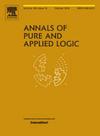Universal proof theory: Feasible admissibility in intuitionistic modal logics
IF 0.6
2区 数学
Q2 LOGIC
引用次数: 0
Abstract
We introduce a general and syntactically defined family of sequent-style calculi over the propositional language with the modalities and its fragments as a formalization for constructively acceptable systems. Calling these calculi constructive, we show that any strong enough constructive sequent calculus, satisfying a mild technical condition, feasibly admits all Visser's rules. This means that there exists a polynomial-time algorithm that, given a proof of the premise of a Visser's rule, provides a proof for its conclusion. As a positive application, we establish the feasible admissibility of Visser's rules in sequent calculi for several intuitionistic modal logics, including , , their extensions by the modal axioms T, B, 4, 5, and the axioms for bounded width and depth and their fragments , propositional lax logic and . On the negative side, we show that if a strong enough intuitionistic modal logic (satisfying a mild technical condition) does not admit at least one of Visser's rules, it cannot have a constructive sequent calculus. Consequently, no intermediate logic other than has a constructive sequent calculus.
通用证明理论:直觉模态逻辑中的可行可接受性
我们在模态为{□,◇}的命题语言及其片段上引入了一系列通用的、语法上定义的序列式计算,作为构造性可接受系统的形式化。我们称这些计算为构造式计算,并证明任何足够强的构造式顺序微积分,只要满足一个温和的技术条件,就可以接受所有的维塞尔规则。这意味着存在一种多项式时间算法,只要给定一个维塞尔规则的前提证明,就能为其结论提供证明。作为正面应用,我们为几种直觉模态逻辑建立了维塞尔规则在时序计算中的可行可接受性,这些模态逻辑包括 CK、IK 及其模态公理 T、B、4、5 的扩展,以及有界宽度和深度公理及其片段 CK□、命题宽松逻辑和 IPC。从反面来看,我们证明了如果一个足够强的直观模态逻辑(满足一个温和的技术条件)不接受至少一条维塞尔规则,它就不可能有构造时序微积分。因此,除了 IPC 之外,没有任何中间逻辑具有构造时序微积分。
本文章由计算机程序翻译,如有差异,请以英文原文为准。
求助全文
约1分钟内获得全文
求助全文
来源期刊
CiteScore
1.40
自引率
12.50%
发文量
78
审稿时长
200 days
期刊介绍:
The journal Annals of Pure and Applied Logic publishes high quality papers in all areas of mathematical logic as well as applications of logic in mathematics, in theoretical computer science and in other related disciplines. All submissions to the journal should be mathematically correct, well written (preferably in English)and contain relevant new results that are of significant interest to a substantial number of logicians. The journal also considers submissions that are somewhat too long to be published by other journals while being too short to form a separate memoir provided that they are of particular outstanding quality and broad interest. In addition, Annals of Pure and Applied Logic occasionally publishes special issues of selected papers from well-chosen conferences in pure and applied logic.

 求助内容:
求助内容: 应助结果提醒方式:
应助结果提醒方式:


